Related Research Articles
Medicare is the publicly-funded universal health care insurance scheme in Australia, operated by the nation's social security department, Services Australia. Medicare is the principal way Australian citizens and permanent residents access most health care services in Australia. The scheme either partially or fully cover the cost of most primary health care services in the public and private health care system. All Australian citizens and permanent residents have access to fully covered health care in public hospitals, funded by Medicare, as well as state and federal contributions. International visitors from 11 countries have subsidised access to medically necessary treatment under reciprocal agreements.
Health care in Ireland is delivered through public and private healthcare. The public health care system is governed by the Health Act 2004, which established a new body to be responsible for providing health and personal social services to everyone living in Ireland – the Health Service Executive. The new national health service came into being officially on 1 January 2005; however the new structures are currently in the process of being established as the reform programme continues. In addition to the public-sector, there is also a large private healthcare market.

The European Health Insurance Card (EHIC) is issued free of charge and allows anyone who is insured by or covered by a statutory social security scheme of the EEA countries, Switzerland, and the United Kingdom to receive medical treatment in another member state free or at a reduced cost, if that treatment becomes necessary during their visit, or if they have a chronic pre-existing condition which requires care such as kidney dialysis. The term of validity of the card varies according to the issuing country. Continued reciprocal healthcare access between the EU and the UK has been agreed, and the UK is issuing a new UK Global Health Insurance Card (GHIC) valid in the EU.

The Health Service Executive (HSE) is the publicly funded healthcare system in Ireland, responsible for the provision of health and personal social services. It came into operation on 1 January 2005.

The Department of Social Protection is a department of the Government of Ireland, tasked with administering Ireland's social welfare system. It oversees the provision of income support and other social services. It is led by the Minister for Social Protection.
Charges for prescriptions for medicines and some medical appliances are payable by adults in England under the age of 60. However, people may be exempt from charges in various exemption categories. Charges were abolished by NHS Wales in 2007, Health and Social Care in Northern Ireland in 2010 and by NHS Scotland in 2011. In 2010/11, in England, £450 million was raised through these charges, some 0.5% of the total NHS budget. In April 2021 the charge was raised to £9.35 for up to a three-month supply of each item. In 2022, for the first time since 2010, the charge was not increased.
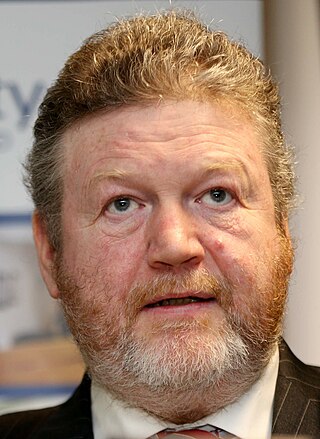
James Reilly is an Irish former Fine Gael politician, businessman and medical doctor who served as a Senator from May 2016 to March 2020. He previously served as Acting Minister for Children and Youth Affairs from February to May 2016, Minister for Health from March 2011 to July 2014 and deputy leader of Fine Gael from 2010 to 2017. He was a Teachta Dála (TD) for the Dublin North constituency from 2007 to 2016. He subsequently announced his retirement from politics after he lost his bid for election for his old seat at the 2020 general election.
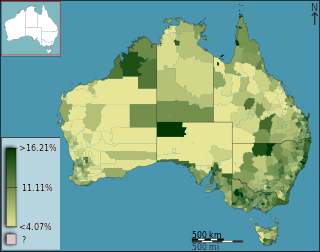
Health care in Australia operates under a shared public-private model underpinned by the Medicare system, the national single-payer funding model. State and territory governments operate public health facilities where eligible patients receive care free-of-charge. Primary health services, such as GP clinics, are privately owned in most situations, but attract Medicare rebates. Australian citizens, permanent residents, and some visitors and visa holders are eligible for health services under the Medicare system. Individuals are encouraged through tax surcharges to purchase health insurance to cover services offered in the private sector, and further fund health care.
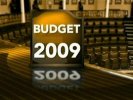
The 2009 Irish budget was delivered on 14 October 2008, as the first budget in the tenure of Fianna Fáil's Brian Lenihan as Minister for Finance and the first of Taoiseach Brian Cowen's tenure. It was brought forward from its usual December date due to the global financial crisis. The budget, labelled "the toughest in many years", included a number of controversial measures such as a proposed income levy and the withdrawal of previously promised HPV vaccines for schoolgirls. Other results of the budget included a new income levy being imposed on all workers above a specified threshold and the closure of a number of Irish Army barracks near the border with Northern Ireland.
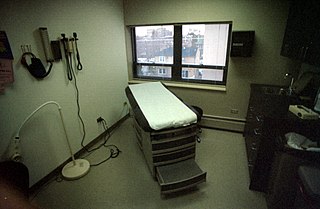
A doctor's office in American English, a doctor's surgery in British English, or a doctor's practice, is a medical facility in which one or more medical doctors, usually general practitioners (GP), receive and treat patients.

Simon Harris is an Irish Fine Gael politician who has served as Minister for Further and Higher Education, Research, Innovation and Science since June 2020. He has also been serving as Minister for Justice since December 2022 to facilitate the maternity leave of Helen McEntee. He has been a Teachta Dála (TD) for the Wicklow constituency since 2011. He previously served as Minister for Health from 2016 to 2020 and Minister of State at the Department of Finance from 2014 to 2016.
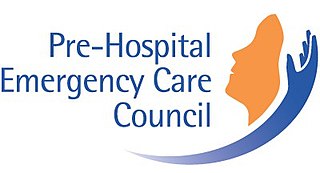
The Pre-Hospital Emergency Care Council (PHECC) is an independent statutory organisation responsible for implementing, monitoring and further developing the standards of care provided by all statutory, private and voluntary ambulance services in Ireland. It is also responsible for conducting examinations at six levels of pre-hospital care, the control of ambulance practitioner registration and the publication of clinical practice guidelines.
The Dublin Midlands Hospital Group is one of the hospital groups established by the Health Service Executive in Ireland.

Cherry Orchard Hospital is a public hospital in Ballyfermot, Dublin, Ireland.

The COVID-19 pandemic in the Republic of Ireland has had far-reaching consequences in the country that go beyond the spread of the disease itself and efforts to quarantine it, including political, criminal, educational and sporting implications.
Events during the year 2021 in Ireland. As in most of the world, the COVID-19 pandemic has dominated events in Ireland during this year.
The following is a timeline of the COVID-19 pandemic in the Republic of Ireland in 2021.

The COVID-19 vaccination programme in the Republic of Ireland is an ongoing mass immunisation campaign that began on 29 December 2020 in response to the COVID-19 pandemic in the Republic of Ireland. Ireland's vaccination rollout has been praised as one of the most successful rollouts in the world and was ranked number one in the European Union in terms of its percentage of adult population fully vaccinated, and was also ranked number one in the EU for the number of booster vaccines administered.
Dr. YSR Aarogyasri is an upgradation of Andhra Pradesh's government healthcare scheme Aarogyasri which was launched by the late chief minister Y. S. Rajasekhara Reddy in 2007. The scheme has been revamped into Dr. YSR Aarogyasri by chief minister Y. S. Jagan Mohan Reddy in January, 2020 upgrading the scheme by adding new benefits to it.
The following is a timeline of the COVID-19 pandemic in the Republic of Ireland in 2022.
References
Sources
- "Medical cards". Citizens Information. Dublin: Citizens Information Board. 4 March 2021. Retrieved 4 March 2021.
Citations
- ↑ "State Examinations Commission".
- ↑ "Health Act, 1953". Irish Statute Book . 29 October 1953. Retrieved 1 April 2016.
- ↑ "Committee on Finance. - Health Bill, 1952—Second Stage". Dáil Éireann debates. Oireachtas. 26 February 1953. Retrieved 1 April 2016.
- ↑ Daly, Mary E. (2012). "The curse of the Irish Hospitals' Sweepstake: A hospital system, not a health system" (PDF). Working Papers in History and Policy. University College Dublin: School of History and Archives (2): 5.
- ↑ Meade, Rosie R. (Summer 2014). "Foucault's Concept of Counter-Conduct and the Politics of Anti-Austerity Protest in Ireland". Concept: The Journal of Contemporary Community Education Practice Theory. Moray House School of Education. 5 (3). ISSN 2042-6968.
- ↑ "HSE invites feedback on National Medical Card Unit strategic plan" (Press release). Health Service Executive. 21 March 2016. Retrieved 1 April 2016.
- ↑ Komito, Lee (April 1984). "Irish Clientelism: A Reappraisal" (PDF). The Economic and Social Review. 15 (3): 173–194. Archived from the original (PDF) on 23 September 2016. Retrieved 1 April 2016.
- ↑ McGee, Harry (23 November 2015). "Taoiseach has made 330 representations for medical cards". The Irish Times . Retrieved 1 April 2016.